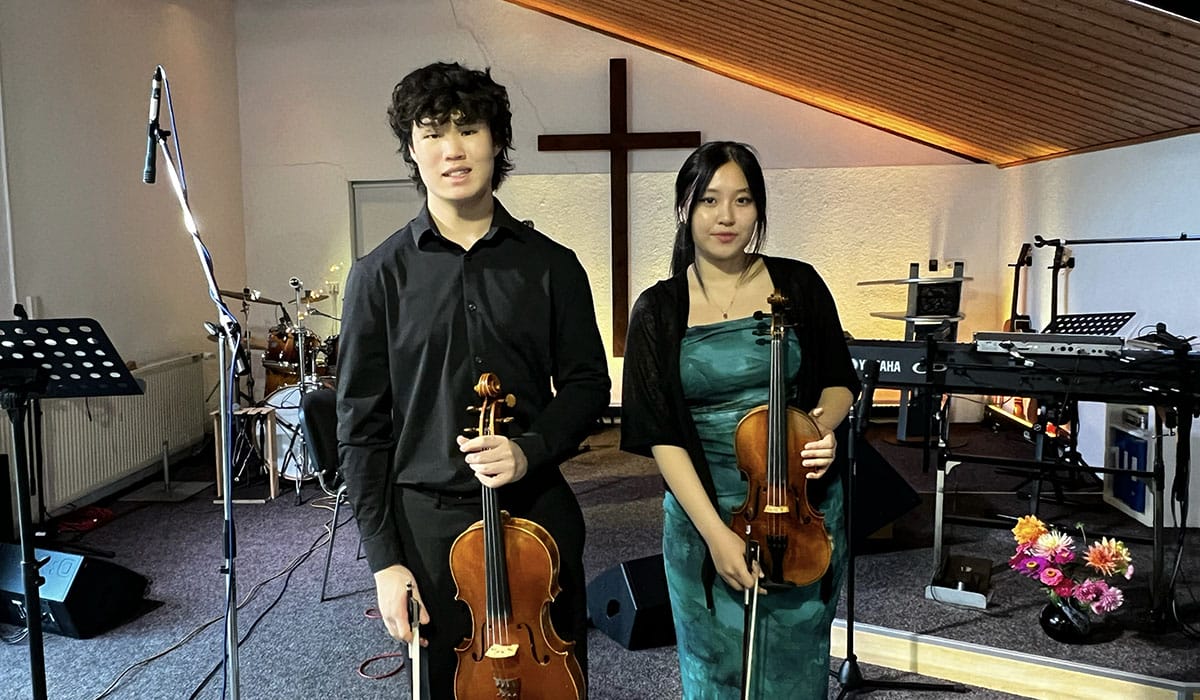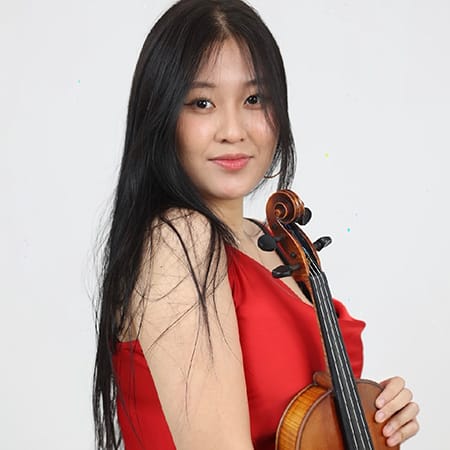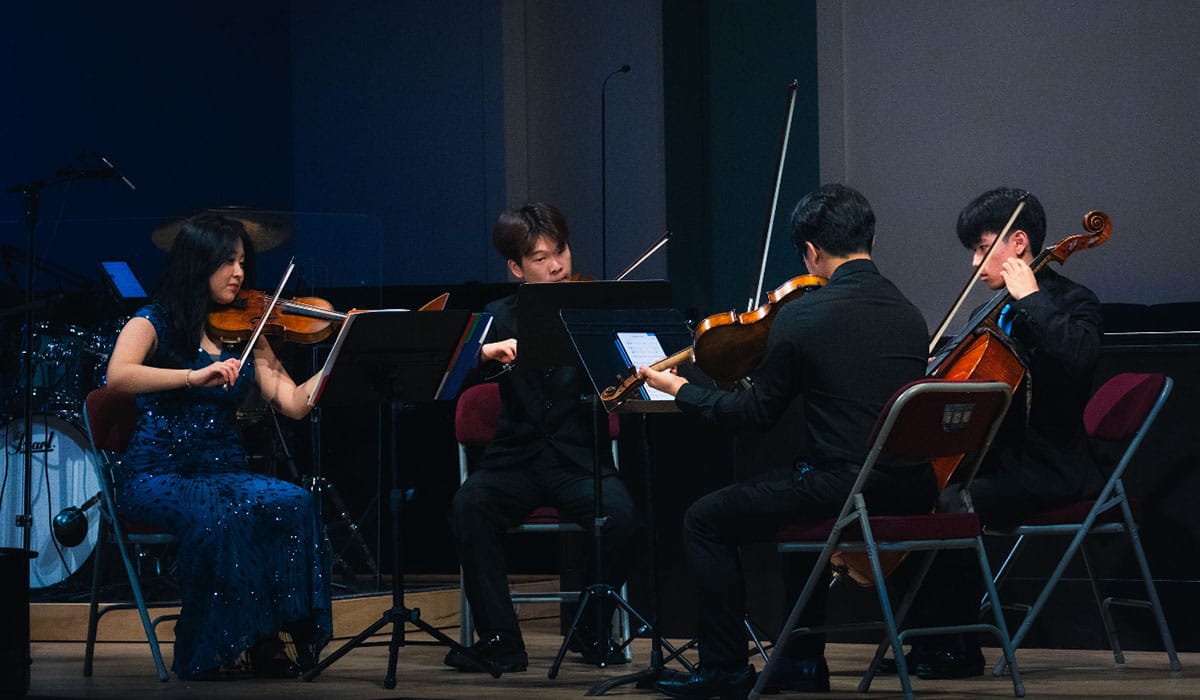Concerts of Compassion That Uplift Lives Through Music

Meet Daily Point of Light Award honoree Chloey Cho. Read her story, and nominate an outstanding volunteer or family as a Daily Point of Light.
Chloey Cho has turned her love for music into a global force for good. As the founder of Solis and Luna Arts, she created a platform that brings the joy of live musical performances to often-overlooked communities—such as seniors in retirement homes and veterans in hospitals. What began as a high school club has grown into an international nonprofit that provides meaningful moments of connection and healing through the arts.
Under Chloey’s leadership, the organization has grown from a single school group to a network spanning 45 regions across 17 states and 10 countries. Solis and Luna Arts now boasts over 500 volunteers, ages 8 to 28, and has reached more than 5,000 patients through its outreach. Chloey’s logistical and creative efforts include preparing music resources, coordinating performances, mentoring regional leaders and overseeing communications—all while maintaining the heart of the mission: uplifting others through music.
The impact of the organization is significant, in both emotional well-being as well as in fundraising. Solis and Luna Arts has raised over $20,000 for Alzheimer’s patients and medical centers. Their performances bring awareness, comfort and a sense of joy to individuals who may feel isolated or forgotten. Each concert serves as a reminder of the power of youth-driven service and the healing potential of the arts.

Chloey also fosters a strong community within the club, where members meet weekly to rehearse, write blog posts and organize events. Even with over 20 students bustling around during meetings, Chloey’s ability to keep everything running smoothly speaks volumes about her leadership and passion. Her role as president is not just honorary, but hands-on and heartfelt, making her a role model for service-minded youth.
Through Solis and Luna Arts, Chloey Cho has built more than a student club—she’s built a movement. Her vision and leadership have inspired chapters beyond her hometown and continue to bridge generations with compassion, creativity and music. Read on to hear more of her story.
Tell us about your volunteer role.
As the founder of Solis and Luna Arts, I work with the Executive Board and 48 region directors of Solis and Luna Arts. Constantly, I aim to make Solis bigger and better, resulting in monthly executive board and region director meetings, where we all come together to put our minds together and brainstorm how we can make Solis a more successful organization and reach more people. Moreover, I focus on keeping track of our impact and engagement. For example, currently we hold 500+ youth members aged 8 to 26 who help in making music therapy more accessible to all. As founder, I also aim to raise funding for our organization. By applying for grants and scholarships, we have raised over $20,000 in funding for our organization.
Why is music so important to you?
When my grandfather experienced mental and physical health issues after the Vietnam War, he was unable to receive proper treatment due to financial burdens and living situations. On top of that, he was unfamiliar and uncomfortable with the bitter tastes of medicine. Music therapy is important to me because it is a healthcare treatment that mitigates such miseries—not only is it free and accessible, but it is also passionate and enjoyable. People overlook music’s potential. Music has so many different benefits, whether it be helping an Alzheimer’s patient remember an old memory, or reducing breast cancer cells to a lesser extent.
What inspired you to get started with Solis and Luna Arts?
It wasn’t in a concert hall that I first learned of the power of music—it was at my grandfather’s house. After I played “Arirang,” a traditional Korean folk song often considered the unofficial national anthem, he began to tell me about his life before he got drafted for the Vietnam War. He spoke in detail about the stray dog that used to follow him home, the times when he would make chapssal-tteok with his family. Never having seen my grandfather talk so much about his personal life before, I sat down with him on the couch. It was like I was getting to know him for the first time—“Arirang” had opened a valve that had been closed shut for so many years. Seeing the powerful effects a single song had on my grandfather, I was inspired to start Solis and Luna Arts.
What are your long-term plans or goals for the organization?
Currently, we implemented a new program in our organization called LunaTunes. This is where Solis members will be paired with a patient who requests a song—a piece—and the Solis member will spend a week preparing the piece, which will then be sent to the patient directly. As we have visited numerous hospitals and nursing homes this year to perform as Solis and Luna, we noticed that there are patients who cannot leave their hospital rooms, their schedules do not align with ours or other obstacles that prevent some patients from watching our music therapy concerts or having music therapy sessions with us. Through this program, we wish to reach everyone. Knowing the importance of music therapy, we want to share this with those who are unable to receive first-hand music therapy. This is just one thing, but it is one step closer in reaching my goal of making music therapy accessible in every way possible.
What’s been the most rewarding part of your work?
The simple things—the nods to Frank Sinatra, the quiet hums to Bohemian Rhapsody, the smiles that erupt when hearing “Can’t Help Falling in Love.” All those little things make me remember why I started Solis and Luna Arts in the first place. Music is medicine and can heal wounds that we may not see. It’s rewarding to see that I, along with other youth, are able to make people’s days a little bit brighter.
Tell us about future partnerships, programs or events that you are excited about.
This year, we received the Yuriko Kikuchi Arigato Award as a fellow of the Riley’s Way Foundation Call for Kindness Fellowship. This is the partnership I am most excited for because it is a fellowship that not only grants us $5,000 to reach our expansion goals, but also curates youth leaders through leadership workshops and meetings. Additionally, I’m excited to collaborate with the New York Youth Symphony Chamber Music Program to continue introducing the importance of youth chamber music programs in the tri-state area.

Why is it important for others to get involved with causes they care about?
I am an avid believer that anyone and everyone can make an impact in society. It is important for people to get involved in the causes they care about because while they gain experience in these fields, they are also able to help others along the way. Even if it is a niche topic, don’t be scared—I wasn’t sure if I would make much of an impact because music therapy is not well known. However, my passion made up for it. With my passion and dedication to music therapy, I was able to make an impact, all because I cared.
Any advice for people who want to start volunteering?
Don’t be afraid to try anything! When I was first starting music therapy volunteering, I was hesitant because of two major reasons: people didn’t know what music therapy was, and my young age. But looking back, I realize those doubts were unnecessary. Through my advocacy and work, I was able to spread the notion of music therapy to people. They were curious, and they learned. Age doesn’t matter when volunteering. Neither does any aspect of your background! As long as you love and are passionate about something, you are able to create a difference.
Do you want to make a difference in your community like Chloey? Find local volunteer opportunities.